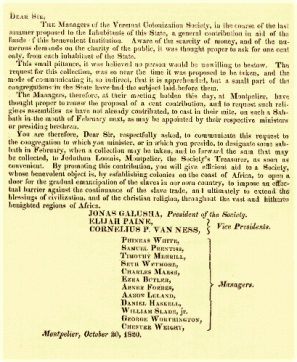Underground Railroad Project: Colonization Movement
Funded by the Vermont Humanities Council. The following materials were compiled in 1997.
From the beginning, the idea of freeing the slaves was controversial. While some groups wished for immediate emancipation, others hoped that freeing the slaves could be done more gradually. One group that felt this way was The American Colonization Society, formed in 1817. They favored freeing slaves gradually by resettling them in Africa.
The objectives of the Society were:
- To rescue the free colored people of the United States from their political and social disadvantages.
- To place them in a country where they may enjoy the benefits of free government, with all the blessings which it brings in its train.
- To spread civilization, sound morals, and true religion throughout the continent of Africa.
- To arrest and destroy the slave trade.
- To afford slave owners, who wish, or are willing, to liberate their slaves, an asylum for their reception.
In 1822, the American Colonization Society established a colony on the West Coast of Africa that eventually became the nation of Liberia. Each year the Society sent a group of immigrants and by 1858, 11,172 emigrants had been transported to Africa (Vermont Colonization Society Annual Report, 1858). Two thirds of these were former slaves. In addition, the Society sent groups of missionaries to convert the natives. The report stated “the tone of morals is believed to be higher and the Sabbath better observed there than in Vermont.”
Vermont’s Colonization Society was formed in 1819 at the State House in Montpelier. The objects of the Society were to:
- remove all negroes, free and enslaved, from the United States to Liberia
- introduce civilization into Africa
- eradicate the slave trade
 Colonization groups formed all over Vermont, often in churches. These included the Baptist Society of East Bethel, the Congregational Society of Montpelier, and the Methodist Society of Pittsford. Often collections were taken in churches to support the colonization efforts. The Society also raised money by collecting donations from members and by giving lectures. The Reverend John Kendrick Converse, pastor of the First Congregational Church in Burlington, was Secretary of the Vermont Colonization Society and made many lecturing trips through New England. On October 17, 1832, he preached before the Vermont Colonization Society at Montpelier "A discourse on the Moral, Legal and Domestic Condition of our Colored Population" (Siebert, 16).
Colonization groups formed all over Vermont, often in churches. These included the Baptist Society of East Bethel, the Congregational Society of Montpelier, and the Methodist Society of Pittsford. Often collections were taken in churches to support the colonization efforts. The Society also raised money by collecting donations from members and by giving lectures. The Reverend John Kendrick Converse, pastor of the First Congregational Church in Burlington, was Secretary of the Vermont Colonization Society and made many lecturing trips through New England. On October 17, 1832, he preached before the Vermont Colonization Society at Montpelier "A discourse on the Moral, Legal and Domestic Condition of our Colored Population" (Siebert, 16).
The Colonization Society and the Anti-Slavery Society were often at odds with each other. While both groups said that they were trying to help “an abused and injured race,” they had very different goals--colonizationists wished to remove freed slaves from America while abolitionists wished for the gradual or immediate emancipation of all slaves. Usually abolitionists did not mind that there would be freed black people in society while the colonizationists did. This clipping is from the 1835 Vermont Anti-Slavery Annual Report. It states that they had no confidence that the Colonization Society was really an Abolition Society.
In 1856 the Colonization Society listed many of the objections made by the enemies of colonization:
- Some people believed that the Colonization Society was actually an idea put forth by the slave-holders who wanted slavery to become more secure.
- Others believed that the Society opposed immediate emancipation--in other words, it was believed that the Colonization Society did not want all the slaves to be freed at once.
- Some slaveholders were in favor of the Colonization Society--a fact that angered some northerners. The slaveholders in favor of the Society were those who felt that slavery was evil, yet did not want freed slaves in the United States.
- Other objectors said that the Colonization Society was prejudiced toward African-Americans.
In all their publications, the Colonization Society tried hard to deny these claims and to spread the idea of a colony in Africa. It was difficult to change the abolitionists' ideas of the Colonization Society. There were mixed reports coming back from Liberia and Vermont's local anti-slavery societies constantly passed resolutions such as the following, passed by the Chittenden County Anti-Slavery Society in 1840:
Resolved that the prejudice manifested by Christians against the negroes of this county on account of their Color, is unjust, unchristian and at variance with the whole Gospel of Christ, and is greatly enhanced by the action of the American Colonization Society.
In Vermont, the Colonization Society continued to meet until 1868--with the emancipation of slaves, support for the movement ended.